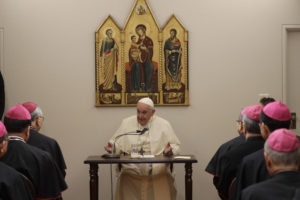Democratic Values, Islam and the Judeo-Christian Tradition Fallacy
There are now warnings emanating from some circles that Muslim leaders are seeking gateways through which to implement an "Islamification" of American politics and society.Editor’s note: This article originally appeared on The Huffington Post.
From the latest criticism of Elena Kagan for her support of an Islamic finance program at Harvard to the escalating mosque construction controversy across the country, there are now warnings emanating from some circles that Muslim leaders are seeking gateways through which to implement an “Islamification” of American politics and society. Such efforts, the assertion goes, are meant to surreptitiously paint Islamic sharia law in a good light through media and academia to the point where Americans willfully allow it to be imposed on the larger body politic.
Those issuing these dystopian theocratic predictions emphasize sharia’s incompatibility with core American democratic values — individual liberty, consent to be governed, equality, and private property — that are generally accredited to the Judeo-Christian tradition (a shorthand ascription that basks in the undue status of conventional wisdom).
Aside from satisfying radical jihadists’ religious war rhetoric, this presents a troublesome paradox for Christians making the claim: how does one effectively fight despotism and promote liberal democratic values for all people while at the same time basing those values in Judeo-Christian tradition? Does the Judeo-Christian trademark on individual liberty not introduce an added barrier for access? Islamic societies, for example, could be forgiven for feeling some aversion to such preloaded propositions.
Fortunately for Christian democracy promoters, they need not shoot themselves in the foot; their contradiction can be easily remedied by admitting that liberal democratic values are really only Christian insofar as Christians have appropriated them from antecedent and parallel modes of thought. These are values that may be historically associated with a Judeo-Christian demographic, but they are by no means philosophically derived from it. For an analogy, one need only imagine a new carmaker claiming original credit for inventing the automobile or discovering combustion — it may have a unique package, but inside it’s an agglomeration of all that came before.
Notions of equality and individual liberty in Western thought have roots in Greco-Roman thinking that far predated and had already seeped into 1st Century A.D. Roman imperial society, wherein Christianity arose under the ambitious precentorship of the apostle Paul. Namely, it appears as though Paul borrowed in bulk from the writings of Epicurus, a historically maligned Greek philosopher (much of that maligning came from later Christians seeking to cover-up the heathenish connection) who emerged during the rise of Alexander in the 4th Century B.C.
Christianity’s Epicurean underpinnings were traced in exquisite detail by the late scholar Norman Wentworth DeWitt in his landmark historical studies, Epicurus and His Philosophy and St. Paul and Epicurus. Most notably, the individualistic and humanistic values to which many modern Christians now claim a copyright are those that Epicurus most emphatically espoused. According to DeWitt, Epicurus “favored a minimum of government control and a maximum of individual freedom” as opposed to his contemporary Plato’s “highly regimented state with a minimum of individual freedom and a maximum of government control.” Likewise, Epicurus formed a cult of peace that embraced a view of humanity that could very well be called “brotherly love” — precisely what we see centuries later in Paul’s “gospel of peace”.
A central tenet of American individual liberty is religious freedom, for which ‘Christian nation’ enthusiasts can scarcely avoid hypocrisy. Historically, institutionalized religious tolerance is by no means an exclusively Christian claim either, as evidenced by the care the Greek historian Herodotus took in documenting religious permissiveness in the ancient Persian Empire under Cyrus, six centuries before Paul. Moreover, Christianity’s own track record for defending religious freedom hardly sets a desirable standard. It took over 1,000 years after the movement went mainstream for such notions of tolerance to emerge from within.
Even then, the first century of public education in America required that all who attend be inculcated with strictly Protestant mores, much to the chagrin of the burgeoning Catholic population (to say nothing of members of any other religious minorities or nonbelievers). In the case of an Islamic center near Ground Zero, the Christian-based religious intolerance from some is obvious and has ironic historical parallels. According to historian Justo Gonzalez, it was Roman imperial policy during the 2nd and 3rd Centuries not to actively hunt Christians for being Christian, but still to punish an individual for that offense if and when his identity became known. Christians were allowed to practice their faith, but if they projected their identities to the general public, they would suffer that society’s wrath.
History also shows modern Christians’ original claim and defense of democratic rule to be equally hollow. When Christianity was first brought into the mainstream fold under Constantine — despite the intolerance Christians previously suffered — it did so as an all but willing partner in his attempt to consolidate autocratic rule and for the next millennium its Church engaged in all manner of political machinations to secure it’s own supremacy. It is not without irony that the pagans who supplanted Roman imperialism independently brought with them a political culture where individual liberty was actually of central concern. The 19th Century English historian Lord Acton tells us that, “[The barbarians’] primitive Republicanism, which admits monarchy as an occasional incident, but holds fast to the collective supremacy of all free men, of the constituent authority over all constituted authorities, is the remote germ of parliamentary government.”
Despite its spotty historical record, the remaining claim Christians make is that their tradition encapsulates liberal values into a single vehicle and that it advanced the doctrine of inclusiveness and multiculturalism. But as Robert Wright, the author of the excellent book, The Evolution of God, points out, Christianity’s inclusivity is actually just a product of the increasingly complex and interconnected Roman imperial society wherein it emerged and competed for attention. Wright notes that, “Even if Paul hadn’t been born, any religion that came to dominate the Roman Empire would have been conducive to inter-ethnic amity. For only that kind of religion could harness network externalities to outpace rivals.” Moreover, most scholars of early Christianity agree that Paul’s embrace of multiethnic inclusiveness was more a means for keeping his disparate religious empire intact than a noble end in and of itself.
All of this should be good news to American Christians who would have individual liberty, equality, and consent of the governed be a desirable goal for all human societies, or who claim to stand for the U.S. Constitution here at home. Models for pluralistic societies based on these a priori values exist throughout the historical landscape, independent of the Judeo-Christian tradition. It bodes well that they may be freely adopted by all cultures. To universalize their message, American Christians need only acknowledge this and forgo chauvinistic claims that fuel both sides of the current religio-cultural divide.
Your support matters…Independent journalism is under threat and overshadowed by heavily funded mainstream media.
You can help level the playing field. Become a member.
Your tax-deductible contribution keeps us digging beneath the headlines to give you thought-provoking, investigative reporting and analysis that unearths what's really happening- without compromise.
Give today to support our courageous, independent journalists.









You need to be a supporter to comment.
There are currently no responses to this article.
Be the first to respond.